BRADFORD, Vt. (WCAX) – From beekeepers to farming interests, supporters and opponents of a bill to ban neonicotinoid-treated seeds in Vermont are taking stock following Monday’s veto of the measure by Gov. Phil Scott.
Walt Gladstone’s 1,600 acres of corn at Newmont Farm in Fairlee is his pride and joy. “Corn is king. Corn is the most important crop that we grow to feed our cows,” Gladstone said.
He grew that corn from seeds treated with neonicotinoids one of the most popular pesticides in the U.S.
Vermont lawmakers passed a bill that would phase out the chemicals that studies show are toxic to birds, bees, and other pollinators. But Governor Phil Scott vetoed it, in part saying it would have a negative impact on dairy farmers.
“This is a big win and I applaud the governor for having the courage and the fortitude to be sensitive to understand it and make the decision he did,” Gladstone said.
Lawmakers could override the veto in a special session next month. Gladstone worries a ban on the seeds would put him at a disadvantage in the global milk market. “To not have the same resources available to us in this seed selection — it’s a game changer, It’s a problem,” he said.
But some Vermont beekeepers, like Andrew Munkres with the Vermont Beekeepers Association, aren’t buying it the governor’s reasoning. “The points that he made are pretty tired at this point,” Munkres said.
Advocates of the bill say farmers would have years to phase out the seeds and the state could issue exemptions when there are no alternatives.
The governor also cited data on a seemingly thriving bee population as his reason for the veto. Munkres says its misleading and that colony loss — not the number of colonies — reveals the real harm neonics are causing. “That doesn’t speak to the health of the bees at all. It speaks to the fact that beekeepers are becoming very adept at becoming bee replacers,” he said.
Gladstone — and Governor Scott — believe more research is necessary before enacting a ban. “To act on it with urgency I think is irresponsible,” Gladstone said.

